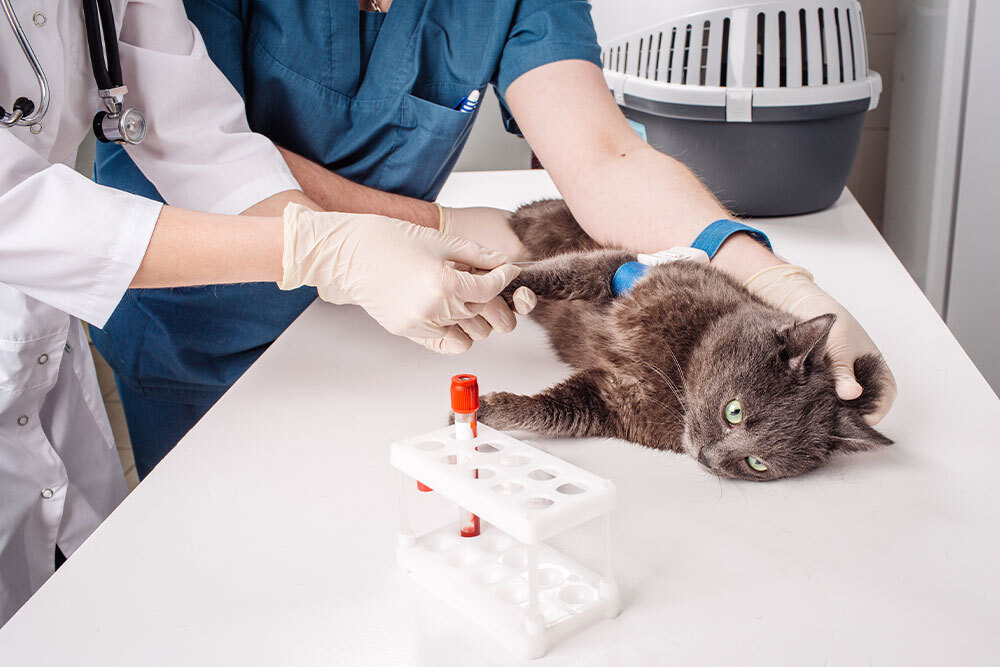At Memorial Villages Animal Hospital in Houston, Texas, we know that not much matters more than your pet’s health and happiness. But even the most attentive pet owners can miss early signs of illness—many diseases progress silently, without any outward symptoms until they become advanced. That’s where annual bloodwork becomes essential. This simple, non-invasive diagnostic tool helps us detect health problems early, monitor chronic conditions, and establish a baseline for your pet’s well-being.
What Is Annual Bloodwork?
Annual bloodwork refers to a set of laboratory tests run on a sample of your pet’s blood. These tests provide a window into the internal health of your dog or cat, offering detailed information that a physical exam alone cannot reveal.
The most common components include:
- Complete Blood Count (CBC) – Evaluates red and white blood cells, hemoglobin, and platelets.
- Blood Chemistry Panel – Assesses organ function, electrolytes, and metabolic health.
- Thyroid Function Tests – Often included for senior pets or those with clinical signs.
- Infectious Disease Screening – Includes tests for heartworm and tick-borne diseases.
For a deeper look at how these tests support proactive care, visit Pet Health Network – Importance of Blood Work for Your Dog.
Why Physical Exams Alone Aren’t Enough
While physical exams are crucial for detecting external signs of illness, they can’t reveal what’s happening on the inside. Many diseases—such as kidney failure, liver disease, or diabetes—don’t produce visible symptoms until they’ve significantly progressed.
Annual bloodwork allows us to:
- Identify early disease markers
- Monitor organ function over time
- Customize care based on your pet’s baseline values
Routine screenings also help establish what’s normal for your pet, making it easier to spot subtle changes year after year. Learn more at AAHA – Why Are Regular Veterinary Visits Important?
What Conditions Can Annual Bloodwork Detect?
Bloodwork plays a vital role in detecting and managing a wide range of medical conditions:
1. Kidney Disease
Early-stage kidney disease may show no signs but can be identified by elevated blood urea nitrogen (BUN) and creatinine. This is especially important in aging cats.
Learn more – Cornell Feline Health Center
2. Liver Disease
Increases in liver enzymes (ALT, AST, ALP) may point to inflammation, infection, or toxins affecting liver function.
3. Diabetes
Elevated glucose levels can indicate diabetes, a manageable condition if caught early.
Explore more – AAHA: Not So Sweet: Diabetes in Pets
4. Thyroid Disorders
- Hypothyroidism in dogs causes weight gain, lethargy, and skin issues.
Cornell University – Hypothyroidism in Dogs - Hyperthyroidism in cats leads to weight loss, hyperactivity, and vomiting.
AAHA – Feline Hyperthyroidism Guidelines
5. Infections and Inflammation
Changes in white blood cell counts can help us identify bacterial, viral, or parasitic infections.
6. Anemia
Low red blood cell counts may suggest blood loss, immune-mediated disease, or bone marrow issues.
7. Cancer
While bloodwork alone cannot diagnose cancer, certain abnormalities—like anemia, high calcium, or elevated liver enzymes—can signal the need for further diagnostics.
Why It Matters Even More for Senior Pets
As pets age, their risk for chronic illnesses increases. Organs such as the kidneys, liver, and heart gradually lose efficiency, and subtle shifts in bloodwork may be the first signs of a developing problem.
For senior pets, we often recommend:
- Bloodwork every 6–12 months
- Additional tests like urinalysis or thyroid panels
- Close monitoring of changes from year to year
Zoetis – Preventive Testing for Senior Pets
AAHA – Recognizing Senior Pet Health Problems
Understanding Your Pet’s Bloodwork
Your veterinarian will explain the results in detail, but here’s a quick overview of what’s included:
| Test | What It Evaluates |
| CBC | Anemia, infection, inflammation, clotting disorders |
| Chemistry Panel | Liver and kidney function, glucose, electrolytes |
| Thyroid Tests | Hypothyroidism (dogs), hyperthyroidism (cats) |
| Infectious Disease | Heartworm, Lyme disease, ehrlichiosis, etc. |
Understanding trends over time is just as important as spotting individual abnormalities. That’s why we track and compare each year’s results to detect patterns early.
The Value of Preventive Investment
You might ask: Is annual bloodwork worth the cost?
The short answer: Yes.
Annual bloodwork can:
- Catch diseases in early, more treatable stages
- Avoid costly emergency visits
- Reduce the emotional toll of late-stage diagnoses
- Improve long-term outcomes and quality of life
At Memorial Villages Animal Hospital, we offer affordable preventive care packages and flexible payment options. Our goal is to make comprehensive care accessible for every pet. Schedule an appointment today.
What to Expect During a Bloodwork Appointment
Here’s how to prepare and what to expect when you visit:
Before Your Visit
- Fasting may be required for 8–12 hours, especially if testing glucose or triglycerides.
- Bring a list of all medications, supplements, and diet details.
During the Appointment
- Blood is typically drawn from a vein in the leg or neck.
- Most pets tolerate the process well, especially with gentle handling.
After the Visit
- Results are usually available within 1–3 business days.
- We’ll schedule a follow-up call or visit to review findings and discuss any next steps.
Abnormal Results: What Happens Next?
Not all abnormal results are cause for alarm—but they do require attention. Next steps may include:
- Repeat bloodwork to confirm results
- Additional diagnostics like urinalysis, x-rays, ultrasound, or biopsy
- Medical management, dietary changes, or referrals to specialists
Ongoing monitoring is often needed to track how your pet responds to treatment.
Preparing for a Successful Visit
Help us provide the best care by bringing:
- A detailed medical history
- A list of current medications and supplements
- Any relevant photos or videos of symptoms (e.g., limping, vomiting)
- Urine or stool samples if requested
Ask questions like:
- “Which parameters are most important for my pet’s age and breed?”
- “How will these results guide our care plan?”
- “When should we repeat these tests?”
FAQs About Pet Bloodwork
Q: My pet seems healthy—do they still need bloodwork?
A: Yes. Many diseases are “silent” in early stages, and bloodwork is the best way to catch them early.
Q: Is fasting always required?
A: It depends on the tests being performed. We’ll let you know ahead of time.
Q: How often should bloodwork be done?
A: Once a year for adult pets, and every 6 months for seniors or those with chronic conditions.
Q: Can bloodwork diagnose cancer?
A: Not directly, but it can reveal changes that prompt further diagnostics.
Q: What if I can’t afford bloodwork?
A: Talk to us about wellness plans, payment options, or phased care approaches.
Your Partner in Prevention
At Memorial Villages Animal Hospital, we’re committed to helping you take a proactive approach to your pet’s health. Annual bloodwork is more than a diagnostic tool—it’s a foundation for early intervention, peace of mind, and a longer, healthier life for your pet.
If you have questions or would like to schedule an appointment, contact us here. We’re here to support you every step of the way.










Leave A Comment